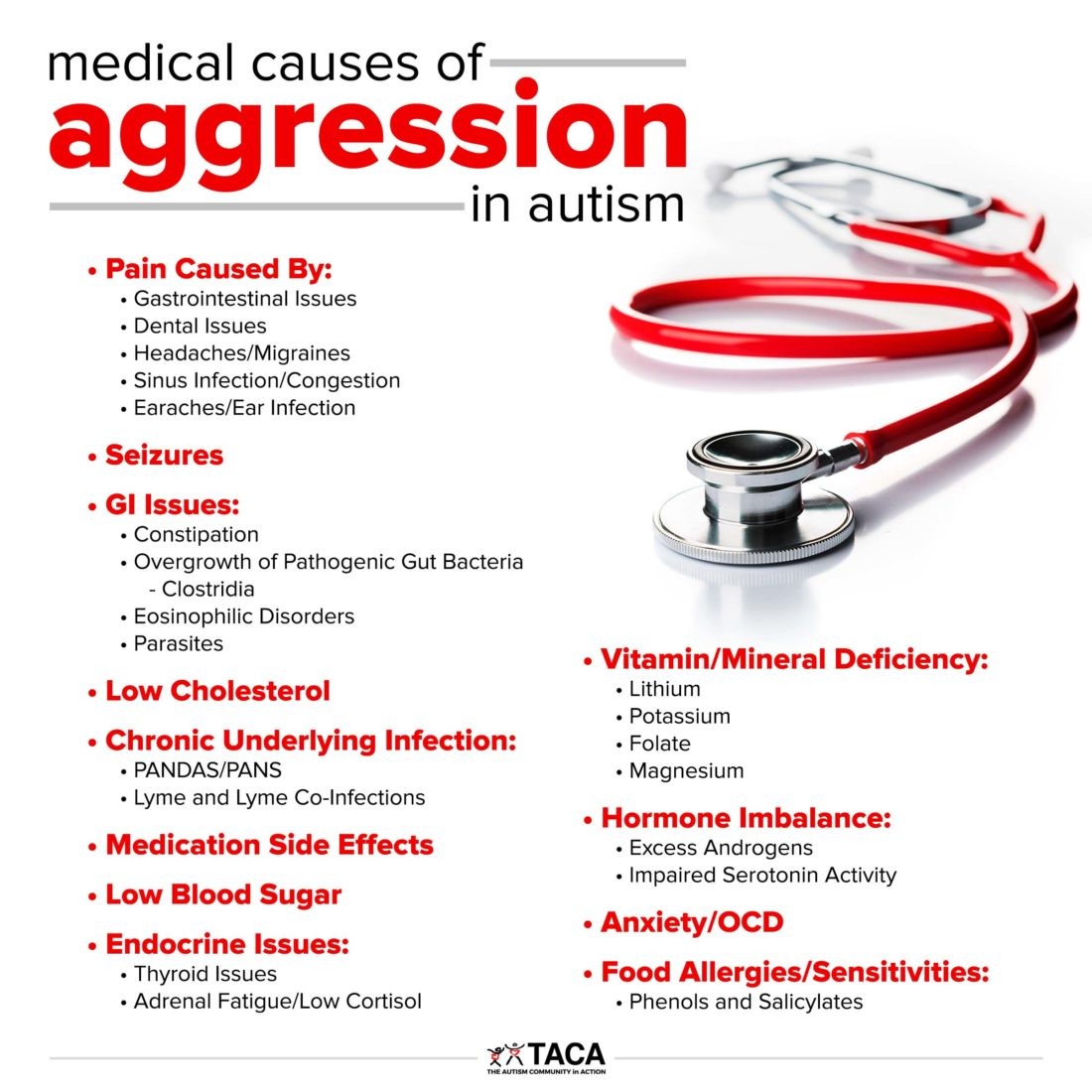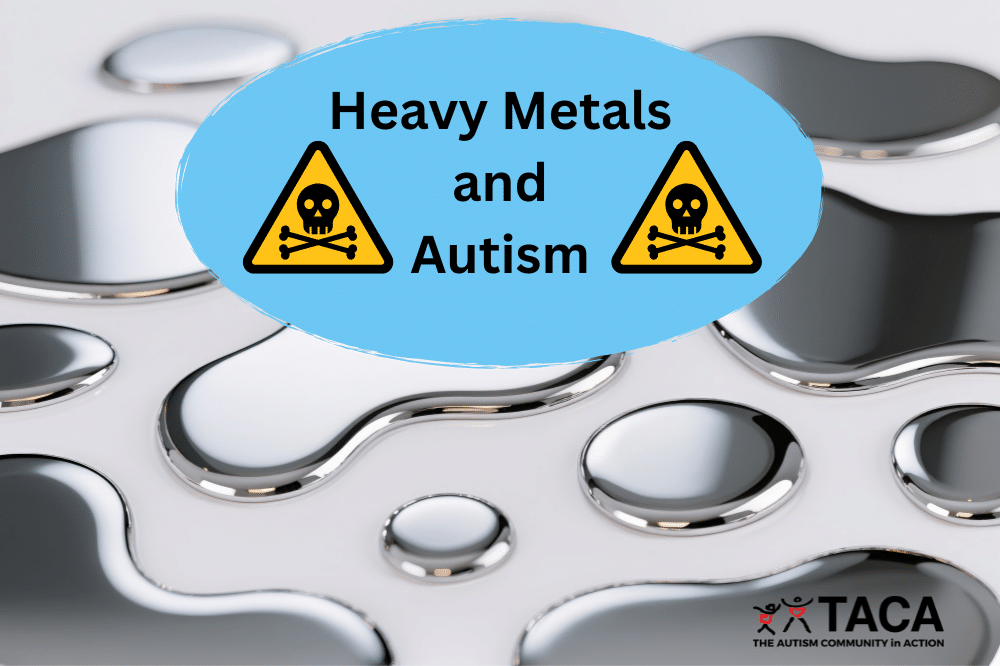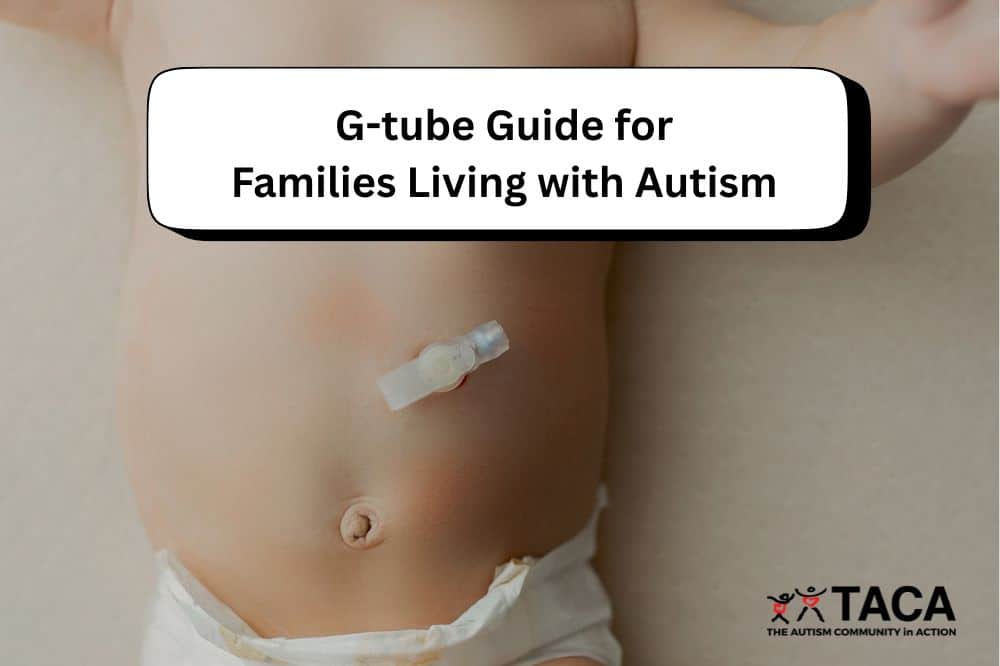Medical Causes of Aggression in Autism

All contents of this resource were created for informational purposes only and are not intended to be a substitute for professional advice, diagnosis, or treatment. Always seek the advice of your physician, therapist, or other qualified health providers with any questions or concerns you may have.
Several underlying medical issues, common to autism, can cause or contribute to aggressive behavior. However, when these medical issues are properly treated, challenging behaviors may decrease or even disappear altogether, significantly improving your child’s outcome and quality of life. This article gives a brief overview of the most common medical causes for aggression in autism as well as treatment options.
Ensuring Your Child Receives Proper Medical Care
As parents, we must understand that behavior is a form of communication. In other words, our kids are not purposefully hurting themselves or others. While many doctors dismiss behavior as just part of autism, our children often use their behavior to communicate to us that they are in pain or don’t feel well.
Therefore, it is crucial to see that your child receives a complete medical workup by:
- Finding and working with a doctor who can effectively identify and address any underlying medical issues that cause or contribute to aggression.
- Read more about Finding a Doctor here.
- Familiarizing yourself with the signs and symptoms of medical issues that trigger aggression so you can effectively advocate for your child in medical settings.
A qualified and experienced functional medicine doctor and other specialists can help you pinpoint how to address aggressive behavior medically. If you need to add a gastroenterologist, neurologist, immunologist, or another specialist to your child’s team, please look for providers who are knowledgeable about autism.
Medical Causes for Aggression in Autism

Below is an overview of potential medical problems that cause aggression to discuss with your child’s doctor.
Pain
As mentioned above, behavior is communication. Many of our kids cannot express their pain in any way other than with behavior. This pain is most often caused by:
- Gastrointestinal issues (see more below)
- Dental issues
- Headaches or migraines
- Sinus infection/congestion
- Earaches/ear infection
Gastrointestinal Issues
Gastrointestinal issues are the most common medical cause of aggression in autism. Not only can they trigger aggressive behavior in response to the pain they cause, but they can also alter neurotransmitters, which influence mood. Below, you will find a brief description of GI issues associated with aggression, including constipation, gut dysbiosis, and eosinophilic disorders.
Constipation
Constipation is extremely painful and can cause aggression in a child or person.
Kids can have bowel movements daily and still be constipated. The best way to check for constipation is with a KUB (an abdominal x-ray). If the KUB shows constipation, a proper clean-out should help constipation, relieve the pain, and help the aggression.
Find more information about constipation in autism here.
Overgrowth of Pathogeneic Gut Bacteria
The gut is our second brain. It produces neurotransmitters and controls mood. Unfortunately, we know that GI problems are four times as common in kids with autism than neurotypical children. Treating an overgrowth of pathogenic bacteria with antibiotics or herbs can be very helpful. A urinary Organic Acids Test (OAT) through Genova lab or Great Plains lab or stool testing can help diagnose this issue.
- One such pathogenic bacteria is Clostridia. There are over 200 known Clostridium strains of flora in the gut, but a select few cause behaviors when they get overgrown. These behaviors can include screeching, aggression, and stimming. Functional medicine doctors typically prescribe antibiotics to treat Clostridia overgrowth.
Eosinophilic Disorders
Eosinophilic disorders such as eosinophilic esophagitis (EoE) and eosinophil-associated gastrointestinal disorders (EGID) are autoimmune disorders diagnosed with scope. They can cause uncontrolled pain, which in turn can make a child aggressive. See a pediatric gastroenterologist to discuss these disorders.
Parasitic Infections
Parasitic infections are often missed, and they are more common than most people realize. When the immune system is weakened, or the pH of the stomach is too basic, parasites can take hold. Chronic digestive issues, aggression, irritability, behavioral changes, and autoimmunity are all signs of a possible parasitic infection. A prominent example of this is toxoplasmosis, an infection from cats, resulting in aggression. Likewise, studies show parasites acquired from under-cooked food cause rage.
Chronic Underlying Infection
PANDAS, PANS, Lyme, and Lyme co-infections are medical issues that can cause aggression. Furthermore, many of the other symptoms associated with each of these chronic infections overlap with symptoms of autism.
PANS / PANDAS or Underlying Infections
PANDAS is Pediatric Autoimmune Neuropsychiatric Disorders Associated with Streptococcal Infections. PANS is Pediatric Acute-onset Neuropsychiatric Syndrome.
Both are primarily autoimmune disorders, resulting from infections or environmental triggers that cause abnormal activation of the immune system. These infections cause the body to create antibodies that attack the basal ganglia region of the brain, causing a whole host of behaviors. However, there are other known causes of PANS, such as concussions and metabolic issues.
There are blood tests to run, including Strep anti-DNASE and ASO titers, but PANS is a clinical diagnosis. It is good to rule out other infections like Mycoplasma, EBV, HHV-6, HSV1, HSV2, Coxsackie, Lyme, and Lyme co-infections.
The following resources can help you learn more about PANDAS/PANS:
- PANDAS/PANS and Autism by Dr. Nancy O’Hara
- PANDAS Network
Lyme and Co-Infections
Some kids with autism have underlying chronic infections, including Lyme, which can cause aggression. For example, Bartonella, a Lyme co-infection, is well-known for its symptom of rage.
If you suspect that Lyme is the cause of your child’s aggression, we recommend working with a Lyme specialist for a couple of reasons:
- Diagnosing Lyme is tricky:
- It is a clinical diagnosis, which means doctors rely on signs and symptoms to diagnose it.
- Lab testing for Lyme and co-infections is highly unreliable. Therefore doctors mainly rely on labs to confirm exposure rather than relying on them to issue a diagnosis.
- Because Lyme can trigger an autoimmune response in the body, treating it requires a multi-pronged approach.
- Many parents are turning to Low Dose Immunotherapy (LDI) to treat underlying infections and help modulate the immune system.
Learn more about Lyme Disease and Autism by clicking here.
Seizure Activity
Seizures are another medical issue, common to autism, that can cause aggression. Furthermore, seizures can cause other symptoms we typically associate with autism, such as speech delays/disorders and stimming.
We encourage all parents of children with autism to familiarize themselves with the signs and symptoms of seizure activity in the brain because not every seizure is evident like a grand mal seizure. In fact, many seizures go unseen and unheard–some occur during sleep. Whether noticeable or not, seizures can be damaging to the brain and/or alter personality. For this reason, we strongly recommend that all people with autism have at least a 24-hour EEG.
The following resources provide helpful information for parents looking to learn more about seizures and autism:
- Seizures in Autism Spectrum Disorder by Richard E. Frye, M.D., Ph.D.
- Click here for a parent-friendly paper on seizures in Autism. Please read it if you have a child with autism even if your child does not have seizures. It is essential to know the warning signs.
Low Cholesterol
Low cholesterol can present as aggression and hostility. Fortunately, a simple blood test can check cholesterol levels. Anything under 145 total cholesterol is considered too low.
You can treat low cholesterol through nutritional modifications. For example, you can include more foods that are high in cholesterol in your child’s diet, such as eggs. Also, there are cholesterol supplements available by prescription.
Low Blood Sugar
If your child’s blood sugar drops, you can see aggression and extreme moodiness. So, if your child wakes up in the morning or after a nap crying, try feeding your child a high fiber and high protein meal before bed.
If low blood sugar is triggering your child’s aggressive behavior, try feeding him/her more frequently. Doing so may help prevent their blood sugar from dipping. Here is a video on the nutrients needed to support blood sugar regulation.
Hormones
Excess Androgens
Androgens are hormones that are involved in reproductive activity. The main androgens are testosterone and androstenedione. A large number of studies have found elevated androgens associated with autism spectrum disorders. See this article for a breakdown of the science behind excess androgens in autism and possibilities for treatment.
Impaired Serotonin Activity
When serotonin in the brain is too low, or the breakdown and clearance of serotonin in the brain is impaired, you will see symptoms such as rage, depression, difficulty sleeping, and more. If you suspect your child has impaired serotonin activity, please keep the following in mind:
- Supporting proper serotonin synthesis with nutrients such as magnesium, B6 (p5p), niacin, methyl B12, and folate are all important.
- 5HTP is the precursor to serotonin.
- For this reason, it can significantly assist with serotonin stabilization.
- Never give 5HTP with SSRIs.
- Neurotransmitters are made in the gut; therefore, a healthy diet free of processed foods can be beneficial.
Vitamin and Mineral Deficiencies
Vitamin and mineral deficiencies are another medical issue that can cause aggression. When trying to determine if a vitamin or mineral deficiency is causing your child’s aggressive behavior, please be sure to ask their doctor about lithium, potassium, folate, and magnesium.
Lithium
To demonstrate how lithium impacts behavior, here is a study showing that cities with no-to-little lithium in their drinking water have more crime, suicides, and arrests than those cities that had a bit more lithium added.
If your child is low in lithium, their doctor may put them on lithium orotate, an essential trace element. It is the low dose supplement form of lithium.
Potassium
Low potassium, also known as hypokalemia, can also cause aggression, depression, or even hallucination. Potassium levels can drop for several reasons. For example, some medications, such as diuretics, can cause low potassium. Also, consistent or prolonged diarrhea can cause low potassium levels, as can sweating.
Electrolytes for re-hydrating are essential but be sure they are not high in sugar. Coconut water is a great natural electrolyte water. There are many low sugar options you can purchase in health food stores.
Folate
Low folate in the brain (found in many kids with autism) can cause irritability and anxiety that can lead to aggression if it goes untreated. To learn more, please see TACA’s article dedicated to Cerebral Folate Deficiency.
Magnesium
Magnesium plays a role in more than 350 important metabolic reactions in the body. Moreover, deficiency is common in kids with autism. One of the many signs of a magnesium deficiency is mood dysregulation, including depression, anxiety, irritability, and even aggression.
Impaired Detoxification
Impaired Liver Detoxification
The liver is the primary detoxifier for what we eat, inhale, or absorb. Many Chinese and Ayurvedic medical practitioners equate chronic anger to poor liver function. Offering liver support, particularly; milk thistle, inositol, lecithin, molybdenum, B vitamins, and more; can help with aggression. Here is a paper on the connection between aggression and poor liver function.
Heavy Metal Toxicity
Heavy metal toxicity can lead to behavioral changes. Lead toxicity, specifically, is known to lead to aggression. Check your house for sources of lead including, but not limited to, imported vinyl mini-blinds, lead paint, water (test your water here), older dishes that are painted with lead-based paint or glaze, or even older toys.
Elevated Amonia
Gut dysbiosis, a diet high in meat and protein, genetic mutations, and some supplements can cause elevated ammonia that the body cannot detoxify. Aggression, uncontrolled laughing, stimming, and ammonia smell in urine or stool are some signs of high ammonia. Addressing underlying gut problems, diet, and supporting the liver can help alleviate symptoms associated with high ammonia.
Mold Toxicity
There are many forms of mold and some are more toxic than others. In addition, some people are more sensitive to mold exposure than others. Mold hides behind walls, floors and in vents; therefore, many parents are completely unaware it is there and causing problems. There are now functional medicine labs that can help you determine if this is an issue for your child. Removing the source of mold, then detoxifying the body can help the child’s aggression significantly.
EMFS
EMF (electromagnetic field) toxicity is a new area of research where studies are showing that aggressive behavior in a variety of animals, including honeybees, increases after exposure to low electromagnetic frequencies. Furthermore, many TACA parents report decreased aggression, behavioral, and sleep issues after reducing their child’s exposure to EMFs. You can reduce your child’s exposure to EMFs by putting their tablet in airplane mode, turning off the Wi-Fi router at bedtime, and decreasing their screen time.
Food Allergies and Sensitivities
Food allergies or sensitivities can also cause undesirable behavior. In fact, some foods, like corn, are well known for causing aggression. This is an article on the emotional and behavioral effects of food allergies/intolerances observed by a doctor. Here is a case study improvement of neuropsychiatric symptoms following control of allergy symptoms with Xolair.
Phenols and Salicylates
Phenols are natural chemical compounds found in many foods such as apples, red grapes, and food dyes.Salicylates are a specific type of phenol. These properties of food can affect children in many different ways. Although phenols can be beneficial for some kids, they may pose problems, including aggression, to others. It is very child-specific. Kids on the autism spectrum seem to be more susceptible to phenol sensitivity. Red ears and cheeks are a tell-tale sign of phenol sensitivity. For more information, please read our article about Phenols and Salicylates.
Adrenal Fatigue, Low Cortisol, and Thyroid Issues
When most people think of adrenal illness, they think of Addison’s or Cushing’s disease. However, adrenal dysfunction can cause symptoms long before you see labs reflecting these diseases.
The adrenal glands help the body handle stress, whether acute or chronic, emotional, or physical. They secrete the hormones that regulate the body’s “fight or flight” response, adrenaline (epinephrine), and noradrenaline (norepinephrine). They also help regulate blood sugar levels, the nervous system, heart rate, and even affect mood and ability to handle situations. The adrenal glands use a lot of vitamin C and it becomes depleted as cortisol is secreted. Therefore, vitamin C may help in adrenal gland recovery.
This study shows low levels of salivary cortisol is associated with aggressive behavior. The adrenal glands and the thyroid are very closely related. Full testing on the thyroid includes TSH, Free T3, Free T4, Reverse T3, and all antibodies.
Anxiety/OCD
Anxiety can cause kids to get aggressive, even if they don’t mean to be. Many underlying medical issues can cause anxiety, and there are many ways to treat anxiety in autism. For more information, please read Anxiety in Autism.
Medication Side Effects
Please be sure to keep detailed notes when starting a new medication or supplement. There are some medications and supplements that are more likely to cause aggression as a side effect than others. Examples of these are steroids, antidepressants, some seizure medications like Keppra, stimulants, and even Leucovorin in some kids. Not all our kids are the same; therefore, their reactions to medications and supplements can vary widely.
Conclusion
Unquestionably, there is a lot to sort through to determine if a medical issue is causing your child’s aggression. Recognizing that behavior is communication is the first step to success. You need to follow the clues to see where they lead you. As the parent, you know your child best. You are their trusted advocate. For this reason, you hold great power in getting your child into a better place. With the right resources, you can do this. It is not an easy road, but TACA is here to help you. Once you find TACA, you are never alone.




